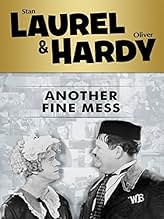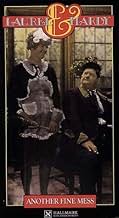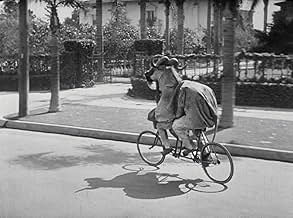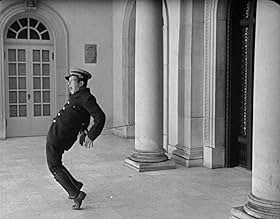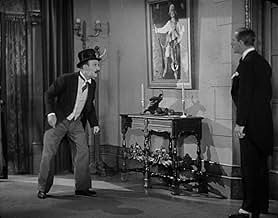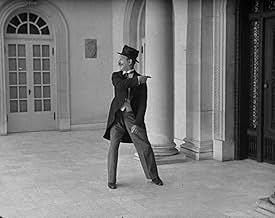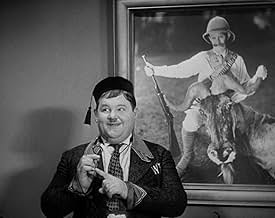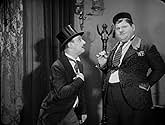IMDb रेटिंग
7.3/10
2.7 हज़ार
आपकी रेटिंग
अपनी भाषा में प्लॉट जोड़ेंTwo homeless vagabonds hide out in a vacant mansion and pose as the residents when prospective lessees arrive and try to rent it.Two homeless vagabonds hide out in a vacant mansion and pose as the residents when prospective lessees arrive and try to rent it.Two homeless vagabonds hide out in a vacant mansion and pose as the residents when prospective lessees arrive and try to rent it.
Harry Bernard
- Policeman
- (बिना क्रेडिट के)
Bobby Burns
- Bicyclist
- (बिना क्रेडिट के)
Betty Mae Crane
- Talking Titles
- (बिना क्रेडिट के)
Beverly Crane
- Talking Titles
- (बिना क्रेडिट के)
Eddie Dunn
- Meadows
- (बिना क्रेडिट के)
James Finlayson
- Col. Wilburforce Buckshot
- (बिना क्रेडिट के)
Charles K. Gerrard
- Lord Leopold Ambrose Plumtree
- (बिना क्रेडिट के)
Bill Knight
- Policeman
- (बिना क्रेडिट के)
Bob Minford
- Policeman
- (बिना क्रेडिट के)
Gertrude Sutton
- Agnes - Maid
- (बिना क्रेडिट के)
Thelma Todd
- Lady Plumtree
- (बिना क्रेडिट के)
फ़ीचर्ड समीक्षाएं
This is an enjoyable remake of the silent feature "Duck Soup", which had played such an important role in establishing Laurel and Hardy as the great comic duo that is now so well- known. This feature follows the same story setup, and expands it slightly while adding in a number of new gags that would not have worked as well on the silent screen.
Once again, Stan and Ollie find themselves forced to impersonate an absent homeowner and his servants, while hosting a prospective renter. The main story is also framed by a brief opening sequence and an interesting, nearly surreal finale. In the main part of the movie, they get a lot of mileage out of the basic situation, and Laurel plays his multiple role in an amusing fashion. James Finlayson gets a couple of good moments near the end, although he does not get as much to do as he did in some of their earlier features.
It packs a lot of material into a little under thirty minutes of running time, and there are a handful of moments when you can just tell that it was an early sound-era movie. But, as this example shows, Laurel and Hardy had little difficulty in successfully adapting their style to the new era.
Once again, Stan and Ollie find themselves forced to impersonate an absent homeowner and his servants, while hosting a prospective renter. The main story is also framed by a brief opening sequence and an interesting, nearly surreal finale. In the main part of the movie, they get a lot of mileage out of the basic situation, and Laurel plays his multiple role in an amusing fashion. James Finlayson gets a couple of good moments near the end, although he does not get as much to do as he did in some of their earlier features.
It packs a lot of material into a little under thirty minutes of running time, and there are a handful of moments when you can just tell that it was an early sound-era movie. But, as this example shows, Laurel and Hardy had little difficulty in successfully adapting their style to the new era.
The comedy duo of Stan Laurel and Oliver Hardy continued to see their popularity rise by Hal Roach Studio's short films in 1930. Their November 1930 "Another Fine Mess" demonstrates how the pair reworked old material and still made it appear fresh and hilarious.
Busily working on their first feature film, Stan and Ollie still had one short film to produce to fulfill a distribution contract. They reached up on the shelves of their previously silent films and selected their 1927 "Duck Soup," based on a play by Stanley's father, Arthur Jefferson, 'Home from the Honeymoon.' The reconstructed film, "Another Fine Mess," delivers for the first time one of Hardy's most famous lines, which has been misquoted because of this movie's title. Viewers misconstrue Oliver's quip to Stan whenever they get into trouble as, "Well, here's another fine mess you've gotten me into." WRONG! Hardy never said that-ever. What he does say is "Well, here's another NICE mess you've gotten me into."
"Another Fine Mess" is also the first film music composer Leroy Shields wrote his catchy Laurel and Hardy's distinctive title song as well as the insertion of special sound effects embedded in his score. Shields' work is recognizable in the 'Our Gang" series and other Hal Roach shorts for which he was busy composing at the time.
Producer Roach thought up a unique way of delivering the opening credits by having two female on-screen announcers read the credits instead of listing the titles. The twins Betty Mae and Beverly Crane, dressed in theater usher uniforms, were tasked in several Roach films between 1930-1931 to say the names of the production personnel and directors. This is the only Laurel and Hardy movie they appeared, but recent copies of "Another Fine Mess" have eliminated their announcements, going directly into the opening scene. Roach stopped the practice when theater owners complained their patrons were yelling back at the women, becoming quite rowdy during their intros.
"Another Fine Mess" solidified Laurel and Hardy's reputation for successfully making the transition from silent to sound. Motion Picture Magazine loved the two, proclaiming, "Right now, they are the funniest comedy team on the Talkie market, with no let down in sight."
The mansion the pair hide out in is still standing at 3500 West Adams Boulevard in Los Angeles. The 1910-built villa is now home to the Peace Theological Seminary & College of Philosophy.
Busily working on their first feature film, Stan and Ollie still had one short film to produce to fulfill a distribution contract. They reached up on the shelves of their previously silent films and selected their 1927 "Duck Soup," based on a play by Stanley's father, Arthur Jefferson, 'Home from the Honeymoon.' The reconstructed film, "Another Fine Mess," delivers for the first time one of Hardy's most famous lines, which has been misquoted because of this movie's title. Viewers misconstrue Oliver's quip to Stan whenever they get into trouble as, "Well, here's another fine mess you've gotten me into." WRONG! Hardy never said that-ever. What he does say is "Well, here's another NICE mess you've gotten me into."
"Another Fine Mess" is also the first film music composer Leroy Shields wrote his catchy Laurel and Hardy's distinctive title song as well as the insertion of special sound effects embedded in his score. Shields' work is recognizable in the 'Our Gang" series and other Hal Roach shorts for which he was busy composing at the time.
Producer Roach thought up a unique way of delivering the opening credits by having two female on-screen announcers read the credits instead of listing the titles. The twins Betty Mae and Beverly Crane, dressed in theater usher uniforms, were tasked in several Roach films between 1930-1931 to say the names of the production personnel and directors. This is the only Laurel and Hardy movie they appeared, but recent copies of "Another Fine Mess" have eliminated their announcements, going directly into the opening scene. Roach stopped the practice when theater owners complained their patrons were yelling back at the women, becoming quite rowdy during their intros.
"Another Fine Mess" solidified Laurel and Hardy's reputation for successfully making the transition from silent to sound. Motion Picture Magazine loved the two, proclaiming, "Right now, they are the funniest comedy team on the Talkie market, with no let down in sight."
The mansion the pair hide out in is still standing at 3500 West Adams Boulevard in Los Angeles. The 1910-built villa is now home to the Peace Theological Seminary & College of Philosophy.
L & H are on the run from the law. They are so broke they spent the night sleeping on a park bench. A nearby was not impressed with Stan after he addresses him as 'Ma'am'. They take refuge from the chase in the basement of Colonel Wilburforce Buckshot, who has just left to go on vacation to South Africa.
While hiding they pretend to be the owner and maid (Stan in his guise as Agnes) of the house when a new married couple (Lord Plumtree and his gorgeous wife) come around to rent the place. Obviously the usual hijinks and misunderstandings follow but the comic timing and Stan's indulgence in his Agnes disguise make it a half-hour laugh riot.
While hiding they pretend to be the owner and maid (Stan in his guise as Agnes) of the house when a new married couple (Lord Plumtree and his gorgeous wife) come around to rent the place. Obviously the usual hijinks and misunderstandings follow but the comic timing and Stan's indulgence in his Agnes disguise make it a half-hour laugh riot.
10Hitchcoc
After a weird reading of the credits, the boys find themselves in a mansion where the staff has disappeared. The millionaire, Colonel Buckshot, is off on a Safari. In order to avoid the police, who are after them, Stan and Ollie must impersonate the absent Buckshot and the maid, Agnes, and Hives, the butler. Their interactions are priceless and the story is well scripted. Everything rolls along fine until Buckshot returns. The byplay between our two buddies is priceless. The inimitable Jimmy Finlayson is Buckshot and his quick responses to the craziness in the house are great. But Stan and Ollie really steal the show. Oliver, with his improvised take on a millionaire, and Stanley, once again in drag, stealing every scene. One of the best of the best.
From the moment this movie begins we know we're in for something a tad unusual. In the early talkie days the folks at the Hal Roach Studio experimented with a new format for delivering opening credits: instead of simply filming title cards in traditional fashion, they built a spiffy Art Deco stage set, complete with proscenium arch, and hired a pair of young girls called the Crane Twins to march out onto the stage to deliver the film's credits verbally. The girls, who are dressed as bellboys, speak in unison at first, then alternate, then bow in tandem as they conclude. The effect is quite odd and (inadvertently?) funny, and kicks off Another Fine Mess on a curious note. The twins introduced several concurrently produced comedies featuring Charley Chase, Our Gang and the 'Boy Friends,' but this marks their only appearance in a Laurel & Hardy movie. I find the girls rather endearing myself, but in any case Roach's experiment with spoken credits didn't last long.
Enter Laurel & Hardy chased by a cop, and we're back on familiar terrain. And yet things aren't quite so familiar after all, for it soon becomes apparent that this film has a different feel from the average L&H comedy. There's an actual plot, comparatively little slapstick, and an unusual amount of verbal humor. It's no surprise to learn that Another Fine Mess was based on a stage sketch, because once the boys seek refuge in the house where most of the action takes place, it does indeed feel like a stage act is underway, as they engage in an extended routine involving disguise and mistaken identity, with some farcical elements included for good measure. Ordinarily Laurel & Hardy didn't place much emphasis on dialog humor as such, but here they do, and happily the material is pretty funny. (Interestingly, the sketch that served as this film's source material was written by Stan Laurel's father, who was a theatrical manager and playwright, though it was said that the old gent did not approve of this adaptation.) In any other L&H short the guys would've spent five or ten minutes trying and failing to enter the house, but this time they've got a rendezvous with The Plot and not so much time for physical shtick.
As it happens, the guys have taken refuge in the home of Colonel Buckshot, who has supposedly departed for Africa. His servants, who were entrusted to rent the place out, have also left for a weekend vacation. Complications ensue with the arrival of a honeymooning couple, Lord and Lady Plumtree, who are interested in renting the place. Even bigger complications are set in motion by Ollie's decision to open the door to the couple in order to get rid of them, which forces Stan to impersonate the butler, which in turn forces Ollie to impersonate Colonel Buckshot, which in turn forces Stan to impersonate Agnes the maid. That's what I love about this movie, that decisive moment that starts the ball rolling. All the guys had to do was ignore the doorbell and wait for the couple to leave, but then they wouldn't be Laurel & Hardy, and we wouldn't have this fine mess to enjoy.
It's amusing to watch Ollie brazenly attempt to assume the role of the wealthy Colonel Buckshot, behaving the way Ollie believes such people behave, and he's well matched by Stan's quick-change impersonations of Hives the butler and Agnes the maid. I especially enjoy the scene between Agnes and Lady Plumtree. We have to assume that Thelma Todd's barely suppressed laughter throughout the scene is genuine; I mean, playing opposite Stan in drag, listening to him ramble on and giggle nervously, who wouldn't crack up? While it's true that the musical score and sound effects used in Another Fine Mess are somewhat more emphatic than the typical Roach comedy of the period, as an earlier reviewer pointed out, I feel this gives the film an agreeably wacky, "cartoon-y" feel suitable to the situation. I love the moment when the real Colonel (Jimmy Finlayson, underplaying as usual) returns home and tries to grasp what has happened. His furious response prompts the silliest wrap-up ever contrived for a L&H short. It's a laugh-out-loud ending -- it was for me, anyway -- and it ensures this movie's status as a treat for comedy connoisseurs.
Enter Laurel & Hardy chased by a cop, and we're back on familiar terrain. And yet things aren't quite so familiar after all, for it soon becomes apparent that this film has a different feel from the average L&H comedy. There's an actual plot, comparatively little slapstick, and an unusual amount of verbal humor. It's no surprise to learn that Another Fine Mess was based on a stage sketch, because once the boys seek refuge in the house where most of the action takes place, it does indeed feel like a stage act is underway, as they engage in an extended routine involving disguise and mistaken identity, with some farcical elements included for good measure. Ordinarily Laurel & Hardy didn't place much emphasis on dialog humor as such, but here they do, and happily the material is pretty funny. (Interestingly, the sketch that served as this film's source material was written by Stan Laurel's father, who was a theatrical manager and playwright, though it was said that the old gent did not approve of this adaptation.) In any other L&H short the guys would've spent five or ten minutes trying and failing to enter the house, but this time they've got a rendezvous with The Plot and not so much time for physical shtick.
As it happens, the guys have taken refuge in the home of Colonel Buckshot, who has supposedly departed for Africa. His servants, who were entrusted to rent the place out, have also left for a weekend vacation. Complications ensue with the arrival of a honeymooning couple, Lord and Lady Plumtree, who are interested in renting the place. Even bigger complications are set in motion by Ollie's decision to open the door to the couple in order to get rid of them, which forces Stan to impersonate the butler, which in turn forces Ollie to impersonate Colonel Buckshot, which in turn forces Stan to impersonate Agnes the maid. That's what I love about this movie, that decisive moment that starts the ball rolling. All the guys had to do was ignore the doorbell and wait for the couple to leave, but then they wouldn't be Laurel & Hardy, and we wouldn't have this fine mess to enjoy.
It's amusing to watch Ollie brazenly attempt to assume the role of the wealthy Colonel Buckshot, behaving the way Ollie believes such people behave, and he's well matched by Stan's quick-change impersonations of Hives the butler and Agnes the maid. I especially enjoy the scene between Agnes and Lady Plumtree. We have to assume that Thelma Todd's barely suppressed laughter throughout the scene is genuine; I mean, playing opposite Stan in drag, listening to him ramble on and giggle nervously, who wouldn't crack up? While it's true that the musical score and sound effects used in Another Fine Mess are somewhat more emphatic than the typical Roach comedy of the period, as an earlier reviewer pointed out, I feel this gives the film an agreeably wacky, "cartoon-y" feel suitable to the situation. I love the moment when the real Colonel (Jimmy Finlayson, underplaying as usual) returns home and tries to grasp what has happened. His furious response prompts the silliest wrap-up ever contrived for a L&H short. It's a laugh-out-loud ending -- it was for me, anyway -- and it ensures this movie's status as a treat for comedy connoisseurs.
क्या आपको पता है
- ट्रिवियाThe main credits are spoken by twin sisters Betty Mae Crane and Beverly Crane wearing theater usher uniforms. As an alternative to standard titles, in a short-lived experiment, they performed the "talking titles" for several Hal Roach productions in 1930 and 1931. This is the only Laurel & Hardy film with spoken credits. The girls were paid $15 ($279 in 2024) each for their efforts.
- गूफ़Lady Plumtree refers to her husband variously as "Leopold," "Ambrose," and "Leopold Ambrose" due to two different versions of the script.
- क्रेज़ी क्रेडिटThe opening credits are spoken by two pretty girls in theater usher uniforms.
- इसके अलावा अन्य वर्जनThe original UK VHS edition of this film (released on the Virgin/VVL label in 1991) omits 16 seconds in the scene where Hardy is looking for his billiard room. He opens the door and escorts Plumtree into a room and says "Now what did I do with that billiard room?" The scene runs from 18:32-18:48 on the UK DVD. The scene is restored in its entirety in the DVD edition.
- कनेक्शनFeatured in Hollywood: The Gift of Laughter (1982)
टॉप पसंद
रेटिंग देने के लिए साइन-इन करें और वैयक्तिकृत सुझावों के लिए वॉचलिस्ट करें
विवरण
- रिलीज़ की तारीख़
- कंट्री ऑफ़ ओरिजिन
- आधिकारिक साइट
- भाषा
- इस रूप में भी जाना जाता है
- Ще одине чудове діло
- फ़िल्माने की जगहें
- उत्पादन कंपनी
- IMDbPro पर और कंपनी क्रेडिट देखें
- चलने की अवधि29 मिनट
- रंग
इस पेज में योगदान दें
किसी बदलाव का सुझाव दें या अनुपलब्ध कॉन्टेंट जोड़ें


